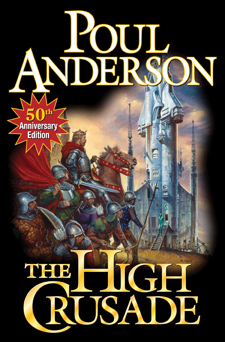This year marks the 50th anniversary of the publication of Poul Anderson’s The High Crusade in the pages of Astounding magazine (later to be known as Analog that very year). In celebration, Baen Books is releasing an anniversary paperback edition on Tuesday, September 7th, with appreciations from some of science fiction’s greatest names.
Tor.com will be posting these appreciations throughout Monday and Tuesday of this week, courtesy of Baen Books. These appreciations originally appeared at WebScription, where you can also sample the first few chapters of The High Crusade.
Sometime in 1959 my father walked downstairs from his attic office at our house on Grove Street in Berkeley with the completed manuscript for The High Crusade. It’s not called Grove Street anymore and he and the house are both gone now, but the book remains. This rollicking romp of medieval mayhem first appeared in Analog magazine as a serial, as many SF novels did in those days. The issue with the first installment (July, 1960) had a cover by Richard Van Dongen, showing knights in chain mail standing in front of a space ship, the blurring of SF/history boundaries mimicking the blurring of the magazine’s logo as the blue letters saying Astounding receded and the bold red letters saying Analog moved forward.
It came out later that year as a Doubleday hardback and was nominated for a Hugo in 1961, losing to A Canticle for Leibowitz, by Walter M., Miller, Jr., certainly no shame there.
A few years later, in May of 1966, Diana Paxson hosted friends and acquaintances at a small medieval-style tourney in her backyard, about a mile from the Grove Street house. That small gathering became known as the First Tourney, from which sprang the Society for Creative Anachronism, now a world-wide organization with tourneys and events happening most weeks, year-round.
Did a spirit of swirling cloaks and clashing steel float over Berkeley for six years, conjured by The High Crusade, with its imaginative juxtaposition of well-grounded history and high-flying imagination? Although not a direct inspiration (that was the “Last Tournament,” an event which took place in Scotland in 1839) surely the novel’s idea of having a sense of fun with history while remaining true to basic facts influenced the shape of the SCA. And my father was an early and enthusiastic member, earning a knighthood for his fighting and additional awards for his poetry, and spent many happy hours in what is called the Current Middle Ages.
And a possible further influence of the book—might the image of horses galloping out of a spaceship’s hold have stuck in the mind of a young Joss Whedon, to emerge in the TV series Firefly?
I must have first read The High Crusade in my early teens, and in memory, the book is fun, with the English villagers and nobles conquering the galaxy after they’ve taken over an alien space ship that landed in their village. The Baron, Sir Roger, merely intended to catch a quick ride to the wars in France, then go on to the Crusades in Jerusalem, but one thing led to another. Rereading it now, I am struck by the attention to details in in all regards: of character and place, attitudes and ways of thinking, military tactics and political strategies. And there is more than adventure to this story: sly wit, love, betrayal, and tragedy have their place.
If you are coming to The High Crusade for the first time, you are in for a treat. If you are revisiting it, you’ll find that it lives up to your fondest memories and more. And that is the best testament to the quality of a book: that it stands up to rereading later in life, revealing more with time.
To quote Sir Roger, surely the most doughty of knights, “Wâes hâeil!”
Daughter of SF grand master Poul Anderson, Astrid Anderson Bear was raised in the science fiction realm. Along with being a master costumer and fiber artist, she has been heavily involved in the science fiction community, from serving on the board for the Clarion West writer’s workshop, to serving on the advisory board for Seattle’s Science Fiction Museum & Hall of Fame, to her involvement with the Science Fiction Writers of America (SFWA).










